
| NHK fiction focuses on problems that matter most to viewers, with finely sculpted depictions of people in difficult situations. NHK's dramas offer a sympathetic but frank account of the human condition. |
Galaxy TV Novel, Saturday Drama, The Human Drama |
| Galaxy TV Novel The evening Galaxy Drama began in 1969 and was renamed Galaxy TV Novel in 1972. The series truly established itself in 1976 with Always Greener, written by Hashida Sugako. The audience share for the first episode was only 7.7%, but had risen to 22.8% by the final episode, helping to make Galaxy TV Novel a popular weekday evening fixture. The story was a family saga in which the mother, on bad terms with her eldest son and his wife, moves in with her younger son who has just bought a house in a Tokyo suburb. Described as "a brutally honest domestic drama," it portrayed the inner thoughts of all three protagonists, the wife, mother-in-law, and husband, showing events from the perspective of each. It divided viewers between supporters of the mother and of the daughter-in-law. The title, Always Greener, became a buzzword and the program was awarded the 8th TV Grand Prix. Following this success, the Galaxy TV Novel featured other strong themes: My Neighbors (1977), based on a true story, was about a person driven to murder by a neighbor's incessant piano playing. Next Door to Happiness (1979) dealt with the issue of inheritance and the problem of aging. These three dramas dealing with social problems were dubbed "The Next Door Trilogy" and achieved very high viewing figures. |
Galaxy TV Novel
also won recognition in other fields, including comedy and suspense. The
Glass Rabbit, which was based on war-time experiences, and Elementary
School Exam War were both highly acclaimed, as were Takeshi's
Home Run and Takeshi’s Home Run
Part 2, which were based on the childhood of comedian and director
Kitano Takeshi. The story of the tough, mischievous and cheerful boy from
downtown Tokyo was told as a sequence of highly entertaining anecdotes.
Its average audience share matched that of Always
Greener and reached 26.4% in the final episode. Galaxy TV Novel ended in March 1989, but was revived in April 1993 as New Galaxy Drama and continues in the form of Drama Serial, which is currently broadcast at 11:00 p.m. on weekday nights. |
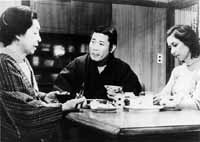 Always Greener |
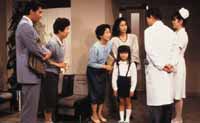 Elementary School Exam War |
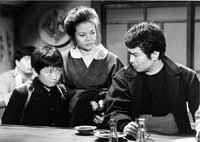 Takeshi's Home Run |
|
|
| Saturday Drama The Saturday Drama slot began in October 1975 in the 8:00 p.m. timeslot. This is a mini-series consisting of three or four self-contained episodes and the duration of each episode ranges from 60 to 90 minutes, depending on the requirements of the plot. In the initial Matsumoto Seicho series, Central Quicksand was awarded the Grand Prix Golden Prague at the Prague International Television Festival. Another successful series, The Journey, with screenplay by Yamada Taichi, began in February 1976. The main character is a former kamikaze pilot, played by Tsuruta Koji. Thirty years after the war, this protagonist is still haunted by his past, remaining unmarried and making a living by working at a security company. His subordinates come from a generation that knows nothing of the war: "I hate young people," he tells them, and scolds them for being pampered. This drama depicting generational conflict received wide acclaim, and 13 episodes were broadcast over six years. One episode, The Journey: Silver Seat, which dealt with the problems of the elderly, received the National Arts Festival Grand Prix. This success paved the way for other talented screenplay writers such as Tamukai Seiken (The Benevolent Generation), Kamata Toshio (Crossroads), Mukoda Kuniko (Berserk), and Hashida Sugako (The Divorce). Saturday Drama has also featured adaptations of animations, and Tsuge Yoshiharu's Crimson Flower won the 1976 National Arts Festival Grand Prix. |
The Human Drama The Human Drama was launched in April 1976 and given the 10:00 p.m. slot on Thursday nights. Its brief was to take an incisive look at human existence by means of cross-sections of life and society. Two years later, the program was moved to 8:50 p.m. on Sunday evenings. In 1981, another leading example of this genre appeared with Yumechiyo's Diary, written by Hayasaka Akira, directed by Fukamachi Yukio, and featuring the actress Yoshinaga Sayuri. The drama was set at a rustic hot spring resort in the San-in Region. The central character, Yumechiyo, runs a geisha house inherited from her mother that for some reason attracts women with a dark past. Yumechiyo has leukemia, but does her best to live life to the full with the help of people around her. The drama unfolds in diary form and depicts many facets of emotions and relationships. It was so well received that a sequel, Yumechiyo's New Diary, was broadcast in 1984. Husband and Wife (1978) anticipated Japan's aging society, turning the spotlight on the problems of growing old. The story is about a man nearing retirement and his wife. He is of a quiet, unsociable disposition and has pushed all household responsibilities onto his wife, who seeks meaning for her life through the activities of her children. One day she runs away from home, while her husband takes a trip by himself without telling anybody where he is going. The drama received rave reviews and a rising audience share that reached 34.8% for the last episode. Investigation, written by Nakajima Takehiro, and Investigation Part 2, by Hayasaka Akira, were also flagship programs in this category. The main character is a lawyer who is made aware of the complexity of human life through the cases he investigates. The series depicted all the joys and sorrows of human life, and continued with Investigation Part 3 and Investigation Part 4. Hayasaka Akira's autobiographical work Hanahenro: Diaries of Showa Pilgrims, shown in 1985, was the story of Japan from the late 1920's to the 80's, seen from the perspective of ordinary people and set against the background of a shop on Shikoku, the smallest of Japan's four main islands. The relationships within the shop owner's family were a reminder of the values and customs of days gone by, and the series enjoyed tremendous popularity. |
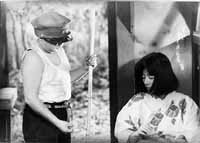 Crimson Flower |
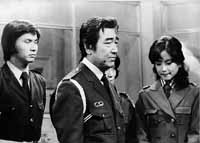 The Journey |
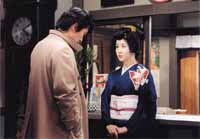 Yumechiyo's Diary |
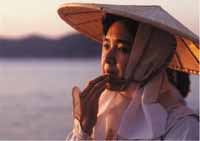 Hanahenro: Diaries of Showa Pilgrims |
